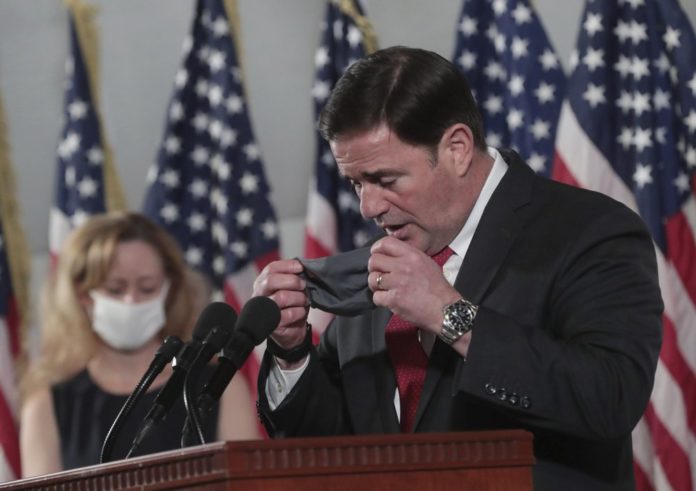
The coronavirus outbreak’s current surge will present Arizona with a hospital crisis that could become a disaster unless the state takes steps such as ordering a three-week stay-home shutdown and implementing a statewide mask mandate, university researchers said.
Without such steps, “it would be akin to facing a major forest fire without evacuation orders,” members of the COVID Modeling Team at the University of Arizona said in a letter Friday to the state Department of Health Services. The team has tracked the outbreak since last spring.
Other steps recommended by the team include providing economic aid to affected small businesses and families and preventing evictions and foreclosures.
Many local governments have imposed mask mandates since Gov. Doug Ducey last summer lifted a prohibition on such orders. The local mandates cover an estimated 90% of the state’s population, but enforcement is lax or non-existent in some places. A statewide measure, the modeling team, wrote, “ensures consistency and strengthens compliance.”
Ducey, early in the outbreak, shut down schools, many businesses, and other establishments but then relaxed the restrictions, leading to a virus surge that made Arizona a national hot spot last summer. He later reinstituted some restrictions.
Now, as in many states, cases and hospitalizations in Arizona have again surged in the wake of school and business reopenings and public weariness with COVID-19 restrictions.
Arizona State University researchers on Nov. 19 projected that hospitals in the state will exceed their capacities unless steps are taken.
While not again imposing new general shutdown mandates, Ducey has taken steps to require masks in schools and help hospitals. He also has repeatedly urged Arizonans to wear masks and take other precautions against COVID-19 spread.
State Sen. Martin Quezada, D-Phoenix, endorsed the modeling team’s recommendations. “State leaders should have political courage and protect public health by enacting them now,” he said on Twitter. “These aren’t unreasonable requests.”
Asked for comment on the modeling team’s letter, which was reported first by KNXV-TV, Department of Health Services spokesman Steve Elliott said the agency was viewing the universities’ forecasts and monitoring information from hospitals, local health departments, and other sources.
“We are on high alert,” Elliott said in an email, adding that mitigation measures such as limits on business occupancy restrictions remain in place.
The DHS director, Dr. Cara Christ, on Friday, said in a video that Arizona faces significant spread and the holidays “have the potential to further increase spread.”
“All of the metrics continue heading in the wrong direction,” she said. “To put it simply, people are letting down their guard.”
The state on Saturday reported 4,136 additional known COVID-19 cases and 36 more deaths, increasing the state’s totals to 322,774 cases and 6,624 deaths.
Hospitalizations related to COVID-19 continue to increase, reaching 2,383 as of Friday, including 553 patients in beds in intensive care units, according to the state’s dashboard.
Seven-day rolling averages of daily new cases, daily deaths, and COVID-19 testing positivity in Arizona all increased in the past two weeks, according to data from The COVID Tracking Project and Johns Hopkins University.
The new cases’ daily average rose from 2,116 on Nov. 13 to 3,849 on Friday, while the daily deaths average rose from 21.1 to 23, and the positivity rate average went from 14.7% to 19.3%.
The number of infections is thought to be far higher than reported because many people have not been tested, and studies suggest people can be infected with the virus without feeling sick.
For most people, the new coronavirus causes mild or moderate symptoms, such as fever and cough that clear up in two to three weeks. For some — especially older adults and people with existing health problems — it can cause more severe illness, including pneumonia and death.
Republished with the permission of the Associated Press.














